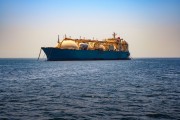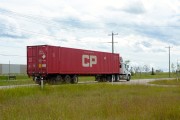From the chaos on Wall Street to the outbreak of listeriosis, Canadians have been hearing a lot about risk lately. It's emerged on the campaign trail as well, where Stephen Harper has called a tax on greenhouse gas pollution an "economic risk" to Canada.
As each day brings fresh tales of disaster in the financial markets, some Canadians may indeed be asking themselves whether we can afford the cost of taking action on global warming now.
Before accepting that premise, we need a more careful look at the various risks we face, so that we can make the right choices about how to manage them. In other words, we can't assess the risk of acting on climate change without looking at the risk of climate change itself and the benefits of taking action.
Two recent government reports have documented the risks that global warming poses for Canada in stark terms.
Health Canada's assessment of our vulnerability to global warming projects climate-related risks to Canadians' health from "the food they eat, the air they breathe, the water they drink, and their exposure to extreme weather events and infectious diseases."
A companion report from Natural Resources Canada detailed the projected impacts of climate change across the country, finding increased risk nearly everywhere. The costs in southern Canada "associated with flooding, wind, hail and ice storms, hurricanes, tornados and wild fires" since 1996 are estimated to be in the hundreds of millions or billions of dollars. Although we can't say that all these events were "caused" by climate change, global warming is expected to make them even more frequent in the future.
The UK government commissioned Sir Nicholas Stern, a former World Bank chief economist, to assess the economic costs of global warming. Stern's comprehensive review concluded that the cost of unchecked climate change would be 5–20 times greater than the cost of taking action to prevent the worst impacts.
Since Stern's report came out in 2006, the scientific findings have become even more urgent. One of the world's most eminent climate scientists, NASA's James Hansen, testified at a recent U.S. Congressional hearing that we are nearing tipping points "that lead to disastrous climate changes that spiral dynamically out of humanity's control."
There's no doubt that tackling any major challenge involves some uncertainty and risk. But weigh that against the enormous costs associated with global warming — not just to the environment, but to our health and livelihoods, in Canada and even more so in the world's poorest places. It's not hard to see which path is ultimately riskier.
Fortunately, each of the parties running in this election agrees that climate change poses a major threat. (For example, Stephen Harper has called global warming "perhaps the biggest threat to confront the future of humanity today.") And most Canadians agree: an Ekos poll released this month found 63 per cent agreement with the statement that "global warming will be the most important issue facing Canada" over the medium to long term.
So we agree on the threat of global warming, but how risky are the alternatives to combat it? Canada's timid climate action to date means we have little experience with tools like emissions taxes or "cap-and-trade" systems, the two main ways to put a price on pollution. And the unknown can be very intimidating.
A look at some of the countries that took the lead in putting a real price on pollution provides some reassurance. Norway, Sweden and Denmark each introduced a tax on greenhouse gas emissions (a "carbon tax") in the early 1990s. According to OECD data, all three have enjoyed economic growth and low unemployment since they introduced their carbon taxes. And Norway has maintained one of the world's largest oil and gas industries while charging a higher carbon tax than any of the main proposals on the table in Canada.
Or take an example from closer to home. At a campaign stop in London, Ontario, the Prime Minister warned that a carbon tax "will hurt the economy of Southwestern Ontario." But according to Nic Rivers, a specialist in climate policy at Simon Fraser University, economic models often find that the light manufacturing sector (an important part of Southwestern Ontario's economy) benefits somewhat from a price on greenhouse gas emissions.
So can individuals. In the longer term, we know that oil and gas will only get more expensive. Already the upfront costs of reducing our energy use, like buying a more efficient furnace, often pay for themselves over time. A price on pollution that increases the cost of fuels will provide even more incentive for those investments in efficiency by shortening the payback period.
As other countries move to take action on climate change, there's growing pressure on laggards like Canada to catch up. Some nations have raised the possibility of trade sanctions or regulations against products that carry a high pollution price tag — a threat that Alberta's oilsands producers are already starting to grapple with.
Climate action isn't just about avoiding the human and environmental chaos of global warming; it's about cashing in on significant new economic opportunities. For example, here's how California Governor Arnold Schwarzenegger explains his interest in climate action: "The computer industry and the internet built the economy of the Silicon Valley. And now green, clean technology — along with biotech — will take California to the next level."
Canada has incredible potential for green innovation as well. We have more than enough expertise and ingenuity to be a world leader in renewable energy, clean cars, or carbon sequestration. But until our federal government accepts the "risk" of taking much bolder climate action than we've seen from Ottawa in the past decade, we won't be able to reap those rewards.
Clare Demerse is a senior policy analyst at the Pembina Institute, a sustainable energy think tank.





